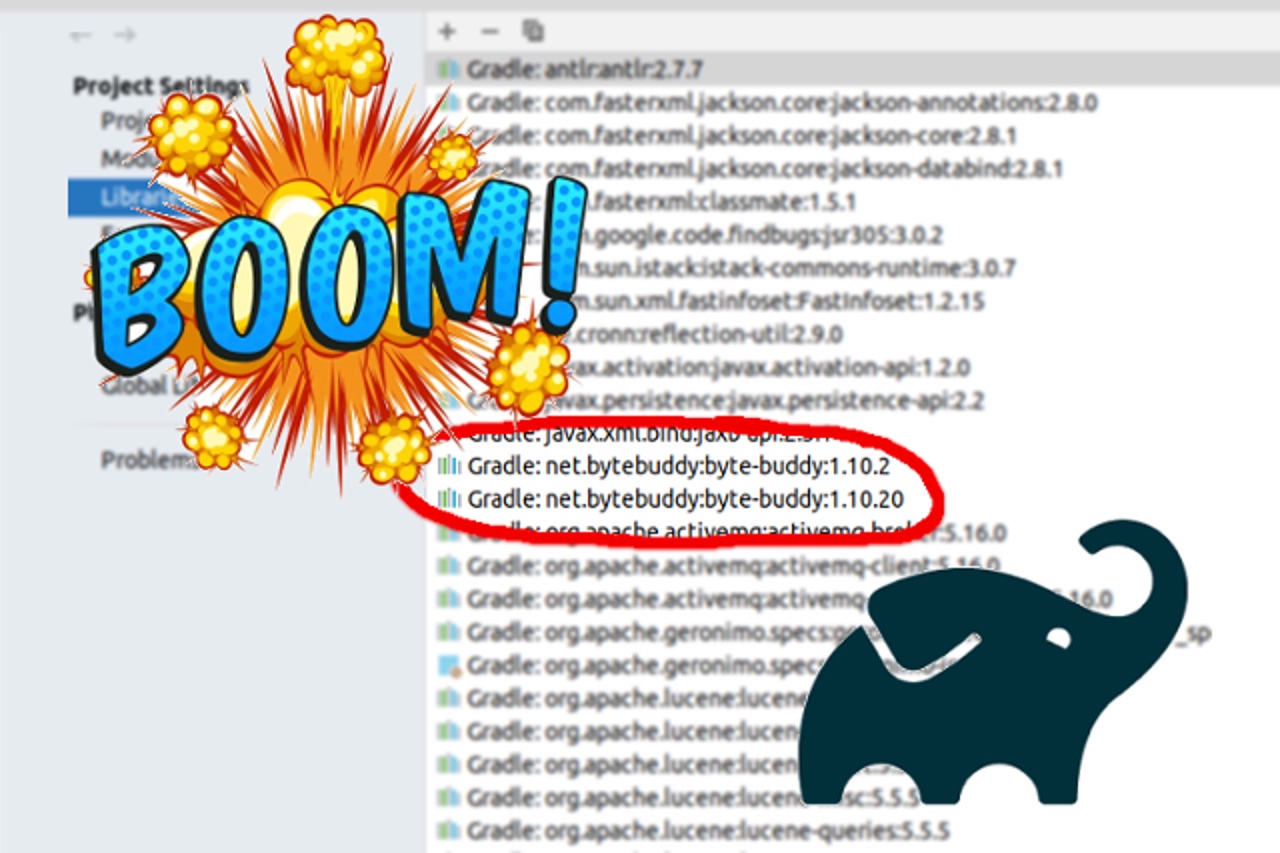You have probably heard the term dependency hell. Modern build tools, like Gradle, handle that problem very well, especially by providing automatic resolution of transitive dependencies. By default, Gradle picks the highest version when many different versions of the same library are required. However, it still has some flaws, and we will focus on one of them, observed in a multi-project in Gradle.
What exactly is the problem?
First of all, we should clarify the terminology. Dependencies can be divided into two categories: explicitly or implicitly declared. The former is called a “first-level” dependency, the latter a “transitive” dependency.
Let’s say in a multi-project we have two sub-projects: project-a and project-b. Our project-a has a first-level
dependency on library lib-x in version 1.2, while project-b has a dependency on library lib-y, which also has a
dependency on lib-x but here it is in a lower version - let’s say 1.1. What’s more project-a depends
on project-b. It could be expressed as:
project-a
- project-b
- lib-x 1.2
project-b
- lib-y
- lib-x 1.1
Running project-a will resolve the transitive dependency lib-x in the highest version 1.2 as expected. However,
running project-b (e.g. tests) will resolve lib-x in version 1.1, so there will be an inconsistency between
dependent projects. A simple solution would be for project-b to have a higher version of lib-x, as this would
result in both resolved versions being the same for both sub-projects. But this isn’t always the case.
The dependency report for project-a with a lower version of lib-x in project-b would look like this:
+--- project-b
| +--- lib-y
| | +--- lib-x 1.1 -> 1.2
+--- lib-x 1.2
Whereas the report for project-b alone will resolve to a different version:
+--- lib-y
| +--- lib-x 1.1
Sure, but actually it makes sense, doesn’t it?
Right, project-b knows nothing about the dependencies of project-a. Indeed, this is
how resolution strategy
works - Gradle picks the highest version from all requested modules in the given context.
So what’s the problem then? In most projects, we treat sub-projects as a whole. Therefore, if dependency resolution is not consistent across all sub-projects, it may result in unexpected behavior at runtime!
Could this really happen? There are some examples of binary incompatibility , but it’s even worse when it comes to runtime differences because it’s harder to spot. Besides, according to Murphy’s Law: “If anything can go wrong, it will” ;)
Now let’s move on and consider a scenario when the inconsistency is between transitive dependencies. We modify our
example so that lib-x in version 1.2 is now required by a first-level dependency lib-z declared in project-a.
project-a
- project-b
- lib-z
- lib-x 1.2
project-b
- lib-y
- lib-x 1.1
This looks even less intuitive because the build tool should do all the dirty work for us , right? ;)
Summarizing, we could consider two relevant scenarios of resolving conflicting versions between sub-projects (provided that one depends on another):
- first-level vs. transitive
- transitive vs. transitive
How to detect version conflicts?
To do this we need a tool that resolves all dependencies from each project separately, then lists them together to find
duplicates. In my case, the natural pick is Intellij IDEA. We can check dependencies in the Libraries view in
the Project structure window. It gathers all resolved dependencies from all configurations. If <group>:<name> is
listed more than once, it could mean you are in trouble :)
The drawback is that you must find these conflicts with your own eyes. Another thing is that buildSrc dependencies are
also included, which could be misleading.
If you are not an Intellij user, you might try Gradle’s dependencies task. However, it only generates reports for a
single project. To use it for all sub-projects we should
do this trick
and define our own task. We may also want to run it only for the testRuntimeClasspath configuration:
allprojects {
afterEvaluate { project ->
if (project.configurations.findByName("testRuntimeClasspath")) {
task allDeps(type: DependencyReportTask) {
configuration = "testRuntimeClasspath"
}
}
}
}
Then, we may try to parse the task output and find conflicting dependencies:
$ ./gradlew allDeps | sed -E 's/:[0-9][^ ]* -> /:/g' | grep -Po "[^ ]+:.+:\d[^ ]*" \
| sort | uniq | cut -d':' -f-2 | uniq -c | grep -v 1
2 commons-beanutils:commons-beanutils
2 commons-collections:commons-collections
...
Let’s explain this code. First by sed -E 's/:[0-9][^ ]* -> /:/g', we want to make sure only resolved versions are
considered. Thus, we cut off the declared version from transitive dependencies marked with an arrow (->). Next
with grep -Po "[^ ]+:.+:\d[^ ]*" only GAVs (<group>:<name>:<version>) are extracted. Then we prepare a unique list
of versions with sort | uniq. Next, we want to group by <group>:<name> to identify duplicated versions, so we cut
off the version with cut -d':' -f-2. Lastly, we count each occurrence uniq -c and print only those with count
greater than one: grep -v 1.
Okay, but is there really no way to tell Gradle to warn me?
Actually, there is. Gradle has a built-in check for transitive dependency conflicts. We could try
the failOnVersionConflict resolution strategy. Then, with the help of the task dependencyInsight, we can narrow down
the conflict to a single dependency. Unfortunately, it’s not really helpful in our case, because single libraries or
large BOMs could have many conflicts themselves (e.g. org.springframework.boot:spring-boot-dependencies:2.2.7.RELEASE)
.
Nevertheless, there is some good news :) In future releases (Gradle 7.x) there are some plans to introduce a new flag in resolution strategy tuning to fail on inconsistent dependency resolution across sub-projects. Currently we can only enforce versions for all configurations in a single project:
java {
consistentResolution {
useCompileClasspathVersions()
}
}
Is there any solution?
Luckily, the official documentation regarding transitives covers a wide range of options. I found a few approaches,
including custom plugins
. Currently the recommended solution for sharing dependency versions across projects is platform. Another solution,
introduced as a feature preview in Gradle 7, is the version catalogs, but it doesn’t offer so
many capabilities.
Our goal is clear: we want the highest common version across all projects. Does the platform seal the deal? Let’s find out!
The whole idea of the platform came from Maven’s BOM (Bill
of Materials), which is a centralized set of dependency versions that “work well together”. This way we can define our
first-level dependencies with just <group>:<name>, as long as they are defined in the platform.
dependencies {
implementation platform(project(":platform"))
implementation "<group>:<name>"
}
This means we can use the same version all over the place. Sounds good! Yet, there are some pitfalls… The major one being that it’s not really solving our problem.
First, let’s take a look at the example of first-level vs. transitive. When the lower version is defined in the base
project project-b, then despite defining lib-x as a first-level dependency in the platform, different versions are
still resolved.
Platform
- lib-x 1.1 (first-level)
- lib-y
- lib-x 1.2 (transitive)
project-a
- Platform
- project-b
- lib-y
- lib-x (version 1.2 resolved)
project-b
- Platform
- lib-x (version 1.1 resolved)
The platform is not magically making versions consistent within itself - the same resolution rules still apply. To fix
this and always use the version of the first-level dependency, we have to use enforcedPlatform instead:
dependencies {
implementation enforcedPlatform(project(":platform"))
}
Now we have the same version across all sub-projects, but actually it is the lower one. This means you can accidentally downgrade dependencies ;) Yet we don’t want to downgrade dependencies, but just align them.
Thus, we could consider two inspections here:
- listing places where
platformis used instead ofenforcedPlatform - report dependencies that are resolved in a lower version than declared (the highest version should be OK, but it always better to upgrade related libraries with a lower version of transitive)
Another snag is the case of transitive vs. transitive. Even with enforcedPlatform we still have to declare transitive
dependency explicitly to get rid of conflict
. And again we might accidentally downgrade both dependencies, so we have to be careful.
Therefore, enforcing the platform is not much different from using force in resolutionStrategy. Both cases are
still hard to maintain because we need additional reports of unused constraints or unintentional downgrades.
Conclusions
The platform seems to be the ideal solution, but it isn’t, especially for maintainers of dependencies. Unexpected dependency conflicts still may occur, especially in multi-projects. Thus, every dependency update needs to be done carefully and wisely. There is no easy way. However, we can develop tools that could support us, like reports. Let’s hope that the future Gradle releases will provide us with warnings about such conflicts.

